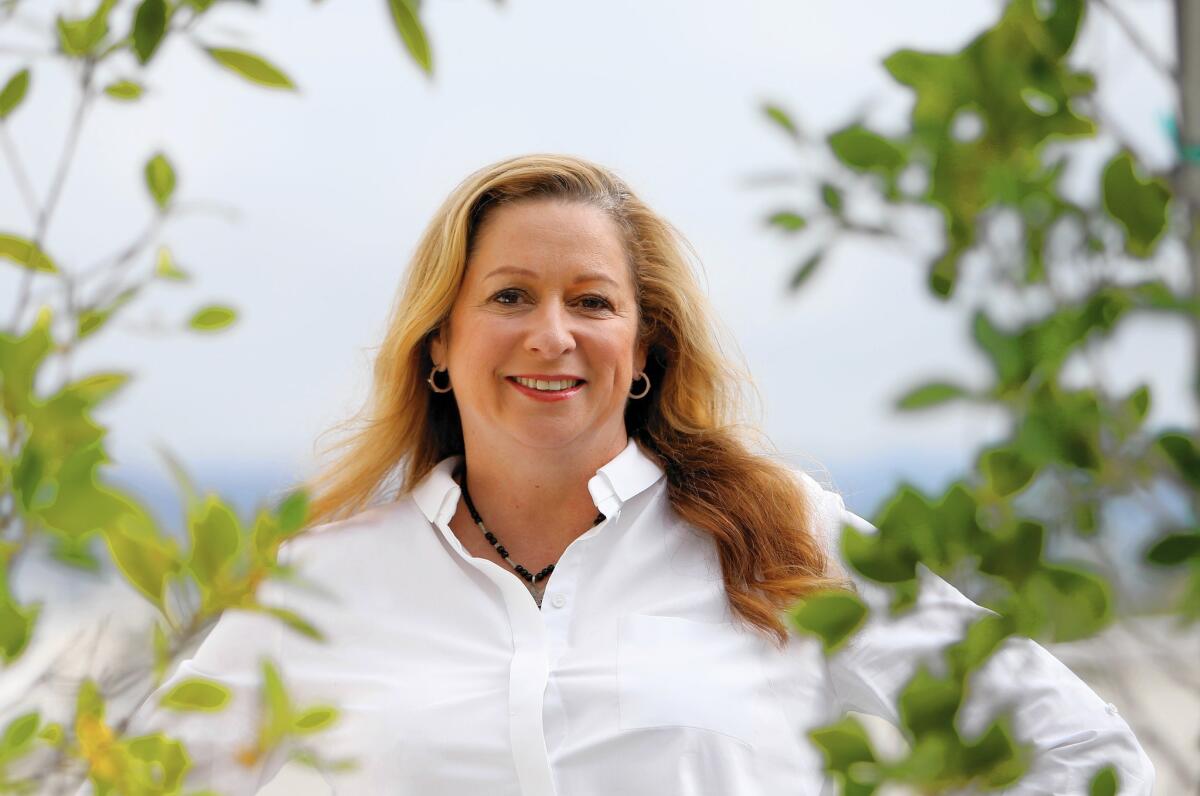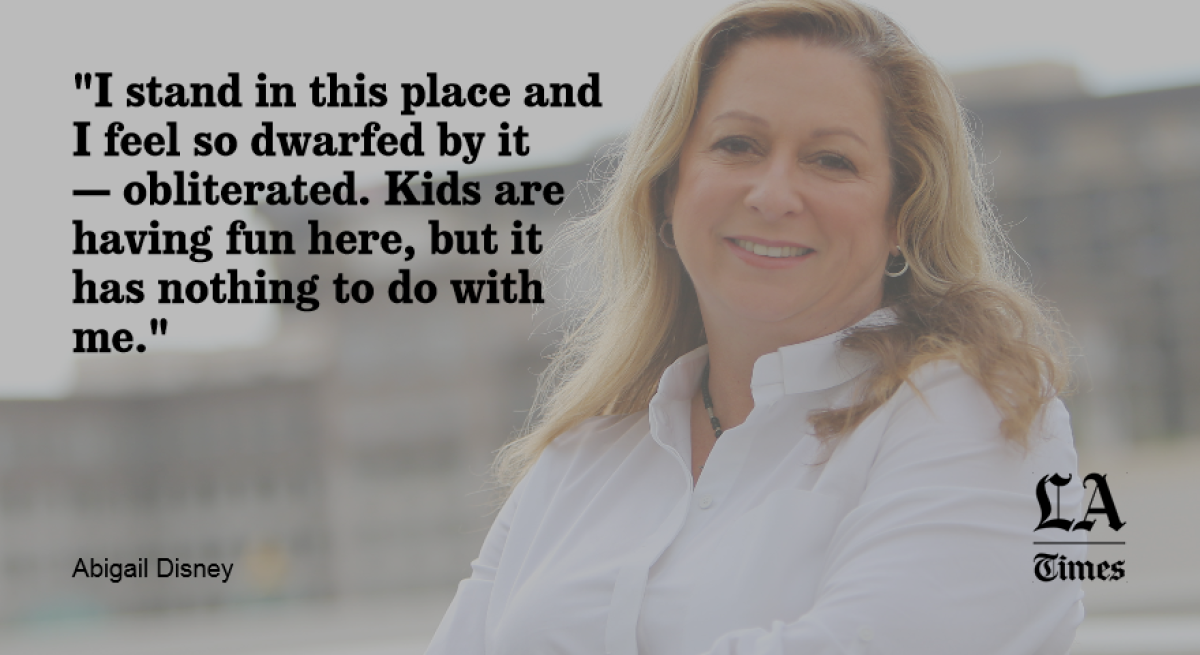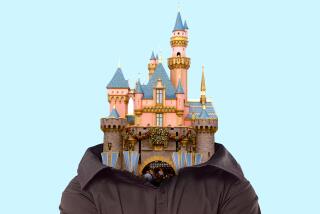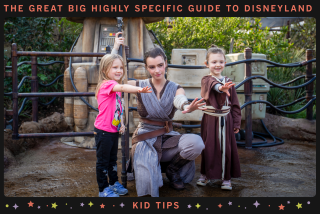Abigail Disney, a liberal among conservatives, examines a minister’s beliefs in ‘The Armor of Light’

Abigail Disney stood on the balcony of Club 33, Disneyland’s members-only restaurant, watching peach-colored sparkles descend from the sky, fading before they hit the Pirate’s Lair.
“I always loved the fireworks,” she said, barely audible above the explosions. “No matter how many times you’ve seen them, they’re always magical.”
She’s seen them a lot. Dozens of times as a girl, she visited Disneyland with her grandfather, Roy O. Disney, co-founder of the park and brother of Walt, who was her great-uncle. They’d squire her around the park, giving her and her siblings special passes to skip the lines. And they got to eat dinner a lot at Club 33. It was here, at this five-star restaurant, that she tried escargot for the first time. She liked it so much that days later, her mother found her eating snails in the garden.
SIGN UP for the free Indie Focus movies newsletter >>
On this night she was at Club 33 not only as dinner host for a gathering of filmmakers and academy members to honor a new documentary but as the film’s director. “The Armor of Light,” this weekend’s release about an evangelical minister trying to come to terms with being both anti-abortion and anti-gun, is the first movie Disney has directed. It’s also a film that may not have sat well with her famously conservative relatives.
But Disney, 55, has always felt like a bit of a family misfit. While attending graduate school at Columbia University, she was so anxious about seeming spoiled that she had a cab drop her off 10 blocks from school. And last year, when Meryl Streep publicly accused Walt of being a “bigot,” his grandniece took to her Facebook page to voice how she “loved” the actress’ remarks. “Anti-Semite? Check.” Disney wrote. “Misogynist? OF COURSE!! Racist? C’mon…”
Watching the crowds disperse after the fireworks display, Disney expressed ambivalence about the happiest place on Earth.
“I stand in this place and I feel so dwarfed by it — obliterated,” she said. “Kids are having fun here, but it has nothing to do with me.”

Abigail Disney
The fear of being judged for her name is also what kept Disney away from filmmaking for so long. After earning three degrees — a bachelor’s from Yale University, master’s from Stanford University and a doctorate from Columbia — she worked largely as a philanthropist, launching nonprofits to fight poverty and encourage global peace building.
If she made movies, she felt “like there would be this horrible level of expectation,” Disney said. “It drives all the neutrality of people’s reactions to you, and why not? I don’t blame them. But I still felt publicly exposed to the idea of failing right there in front of everyone.”
So for her first forays into Hollywood, she remained somewhat behind the scenes. At 47, she launched her own production company, Fork Films, and quietly became one of the documentary world’s biggest financial backers, serving as executive producer on more than two dozen documentaries, including “The Invisible War” and “The Queen of Versailles.”
“She always made it very clear to us that she feels a real responsibility to do something meaningful with her position in life,” said Ronna Gradus, who co-directed “Sexy Baby” and “Hot Girls Wanted” with Jill Bauer — two films about the intersection of technology and pornography that Disney executive-produced. “She feels like she was lucky to be born into this family and given this huge gift that she didn’t deserve more than the next person.”
But after supporting so many documentarians, Disney began to wonder about exploring her own filmmaking voice. At Columbia, she’d written her dissertation on war novels — something she became interested in because she’s a self-admitted “weird freak” but also because she thought they often included important revelations about masculinity. During her research, she became fascinated by violence and weapons, the human impulse to physically harm another being.
These were questions that stuck with her, especially as school shootings and police violence became more prevalent. Meanwhile, evangelicals continued to publicly discuss a “moral approach to guns” — a stance that confused Disney, who didn’t understand what was “more moral than an object that takes life.”
So she reached out to the Rev. Rob Schenck, the chairman of the Evangelical Church Alliance. Schenck is a polarizing figure: A staunch abortion foe, in 1992 he cradled the remains of a human fetus during an anti-abortion march. But as “The Armor of Light” shows, Schenck has in recent years become less obstinate, questioning how the church can advocate life while supporting gun rights.
Still, he was nervous about granting access to Disney as he embarked on his moral journey. The director had no experience with guns other than learning to shoot a .22 at camp, and openly favors abortion rights. But she wanted to trail Schenck as he spoke to the religious community and members of the National Rifle Assn., asking tough questions about belief.
“I think because of her family history, conservatives are not strangers or aliens to her,” said Schenck. “She was truly interested in both sides, even while disclosing who she was. She’d say, ‘You may think I’m a conservative, but I’m not, and I think what you people believe is a crock of whatever.’”
Disney was raised as a strict Catholic. Her grandmother went to Mass each morning at 6 and got mail from the John Birch Society. Her family felt communism was a threat and wanted to “promote the interests of business people and corporations.”
“If you go to Orlando and consider there were just orange groves before my grandfather got there, you really do get a sense of what a well-run business can do to make the world a better place,” said Disney, sitting in her hotel room the day after her trip to the park. “It makes me pause about being a glib liberal.”
It’s clear Disney has a special affinity for her grandfather. Later in the evening, after the Club 33 meal had concluded, she led a group to the hidden apartment where Roy and Walt used to hide out when the park became too chaotic. It was a tiny space, 500 feet or so, decorated with a lot of red glass and needlepoint.
“Here’s the waffle maker,” she said, opening up the iron. “My grandpa used to make me grilled cheese on this.”
Disney, who grew up in North Hollywood, loved coming to Disneyland with her grandfather. “He was like my hero in life, and I loved him liked crazy,” said Disney, who lives in New York and has four children. “Yesterday served as a way back to that and my childhood in a really lovely way. So yes, I’m grateful for it,” she said. “But I hate the fact that the minute you say a mixed thing about it, you sound like this spoiled, entitled, horrible person. I hear poor little rich girl. And I’m not trying to whine. But when the single largest association people ever have with you is something you have no say in, it’s a hard thing to carry.”
Because of her upbringing, she said that she probably wouldn’t have had the “moxie” to make “The Armor of Light” when she was younger. She would have been too apologetic, too meek. But at 55, she said, those things concern her less. She doesn’t want her family’s past to dictate her future. And anyway, she may have more in common with them than she once thought.
“On the surface, my movie looks like the opposite of what my family does, but it’s not,” she said. “Because I don’t want to just make a film about the bad news that makes you want to climb under a rock. I want to talk about what people are capable of. I want to make films about the best of the human experience, and that’s what Walt did.”
Twitter: @AmyKinLA
More to Read
Only good movies
Get the Indie Focus newsletter, Mark Olsen's weekly guide to the world of cinema.
You may occasionally receive promotional content from the Los Angeles Times.











